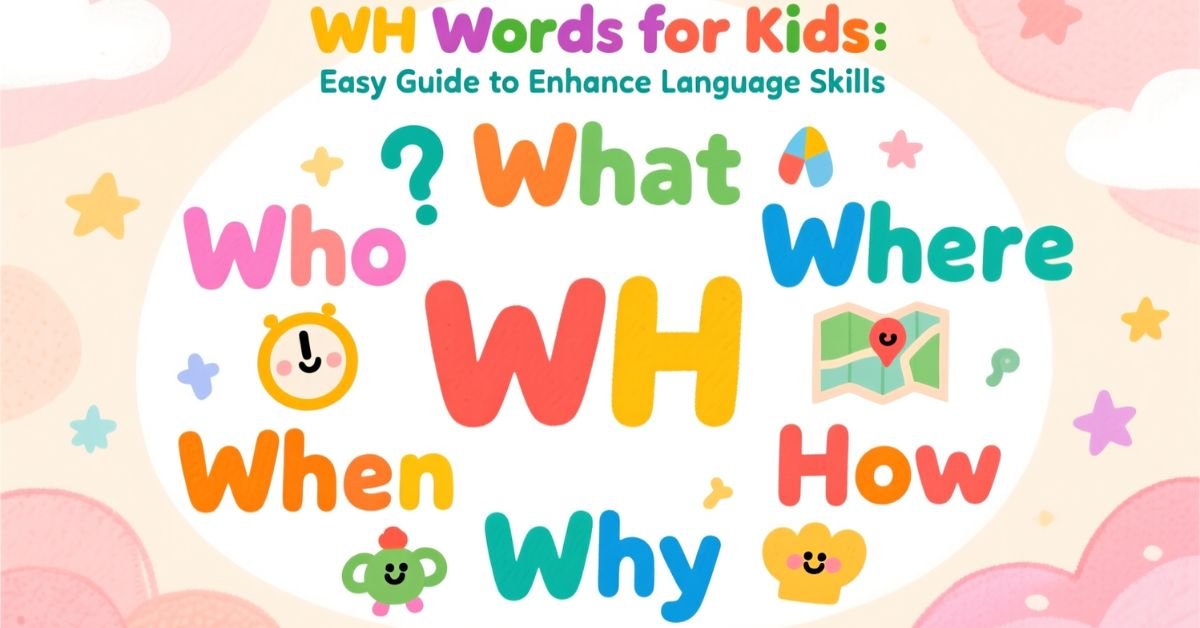Introduction:
WH words for kids are some of the first words children learn to use in daily conversations. These words are essential because they help children gather information, express curiosity, and engage in meaningful dialogue. Mastering WH words is an important step in early language development, allowing kids to ask questions, think critically, and communicate their ideas effectively. Using WH words appropriately also supports vocabulary growth and improves sentence structure as children interact with family, friends, and teachers.
By learning these foundational words, children develop the building blocks for further language skills and literacy. This guide provides an easy-to-follow explanation of WH words, their importance, practical usage tips, and fun activities to reinforce learning. Parents, teachers, and caregivers can use these strategies to support children’s language growth in an interactive and enjoyable way.
What Are WH Words?
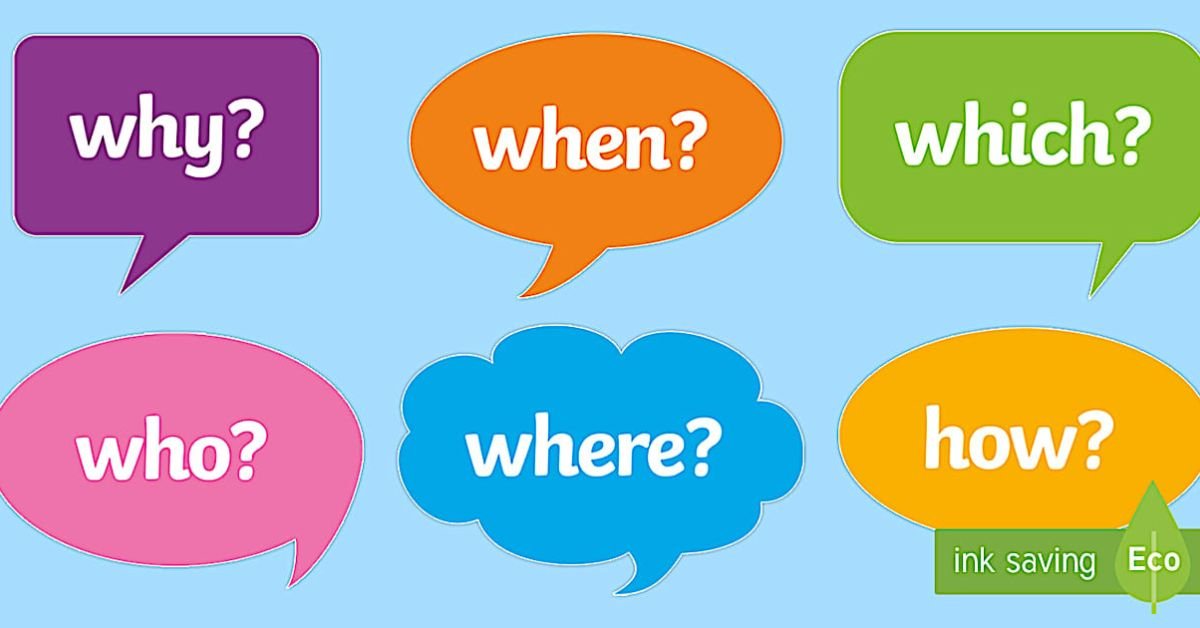
WH words are the question words that typically begin with W or H. These words help form questions and gather detailed information. When children learn how to use WH words, they open up new ways to inquire about the world, express curiosity, and understand things better. Each WH word has its function, and they are all important for the child’s ability to learn new concepts and understand their surroundings.
Here is a breakdown of the most common WH words and their uses:
- Who: Refers to a person or people. It’s used to ask about a person’s identity, role, or actions.
- Example: Who is your teacher?
- What is used to ask about objects, actions, or ideas? It helps kids inquire about objects, activities, or concepts.
- Example: What is your favorite color?
- Where’ is used to ask about a place or a specific location.. It helps children learn about the environment around them.
- Example: Where is your book?
- When: Used to ask about time. This is a great way for children to understand when things happen.
- Example: When is your birthday?
- Why: Asks for reasons or causes. This is a great word for helping kids understand why something happens or exists.
- Example: Why is the sky blue?
- How: Used to inquire about the method or process. It helps kids understand how things are done.
- Example: How do you tie your shoes?
These WH words allow children to form a wide range of questions, helping them gain knowledge about everything from their daily routine to their world at large. As children use these words, they engage with the world around them in a deeper, more meaningful way.
List of WH Words
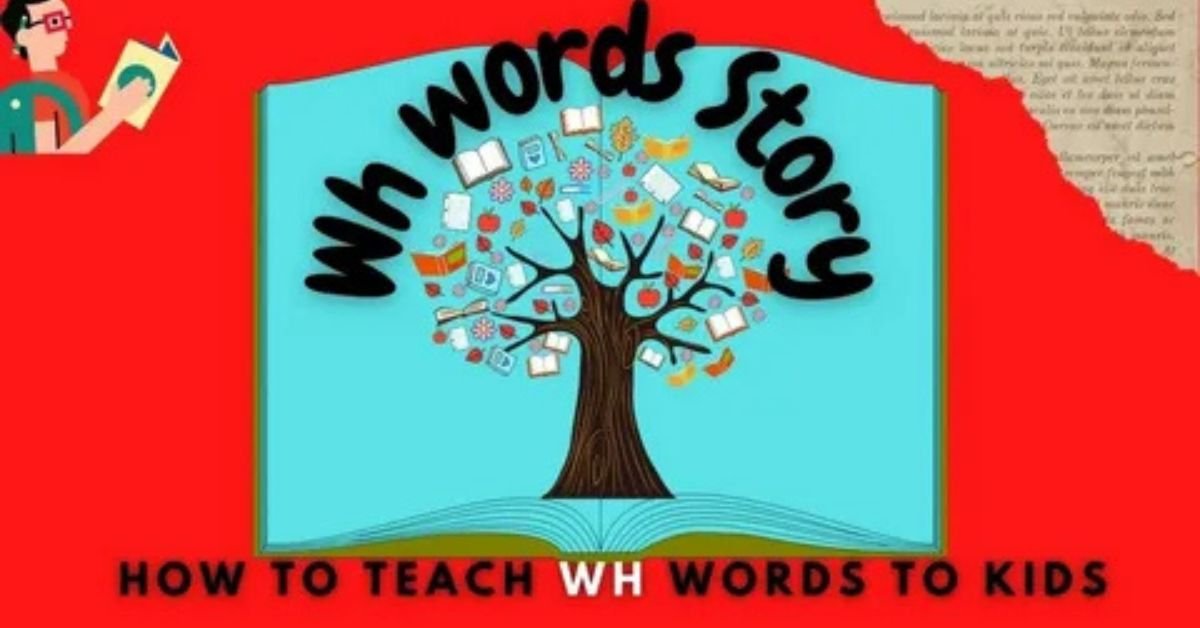
WH words are essential to developing good communication skills. Here’s a detailed list of WH words that kids can learn, along with examples of how they are used:
- Who: used to ask questions about a person or group of people.
- Example: Who is that on the phone?
- What: Asks about things, actions, or concepts.
- Example: What is your favorite food?
- Where: Asks about locations or places.
- Example: Where do you live?
- When: Asks about time-related information.
- Example: When does the movie start?
- Why: Asks about reasons or causes.
- Example: Why do we need to sleep?
- How: Asks about the process or method.
- Example: How do you make a paper airplane?
Additionally, here are a few variations and less common WH words:
- Which: Used when selecting between options.
- Example: Which color do you prefer?
- Whose: Used to ask about ownership.
- Example: Whose shoes are these?
- Whom: Less commonly used but sometimes used instead of who in formal situations.
- Example: To whom should I give this letter?
Each of these words serves a specific purpose in helping kids understand and learn more about their surroundings. Practicing these words will help children engage with others, ask questions, and deepen their understanding of the world.
How to Use WH Words in Sentences
Once kids understand what each WH word means, they need to learn how to use them in sentences. A well-structured question begins with a WH word, followed by the subject, and then the verb. It’s essential to follow this pattern to form a grammatically correct question. Let’s look at some examples of how to use WH words in simple sentences:
- Who:
- Who is your best friend?
- Who is coming to the party?
- What:
- What did you do today?
- What is your favorite game?
- Where:
- Where are you going this weekend?
- Where can I find my pencil?
- When:
- When do you wake up in the morning?
- When are we having dinner?
- Why:
- Why do you like that toy?
- Why are you sad today?
- How:
- How do you ride a bike?
- How do you make spaghetti?
Kids need to practice these sentence structures to ensure they can create questions naturally. Through simple exercises and fun activities, kids can master the art of asking questions and start using them in their conversations.
Why WH Words Are Important for Kids
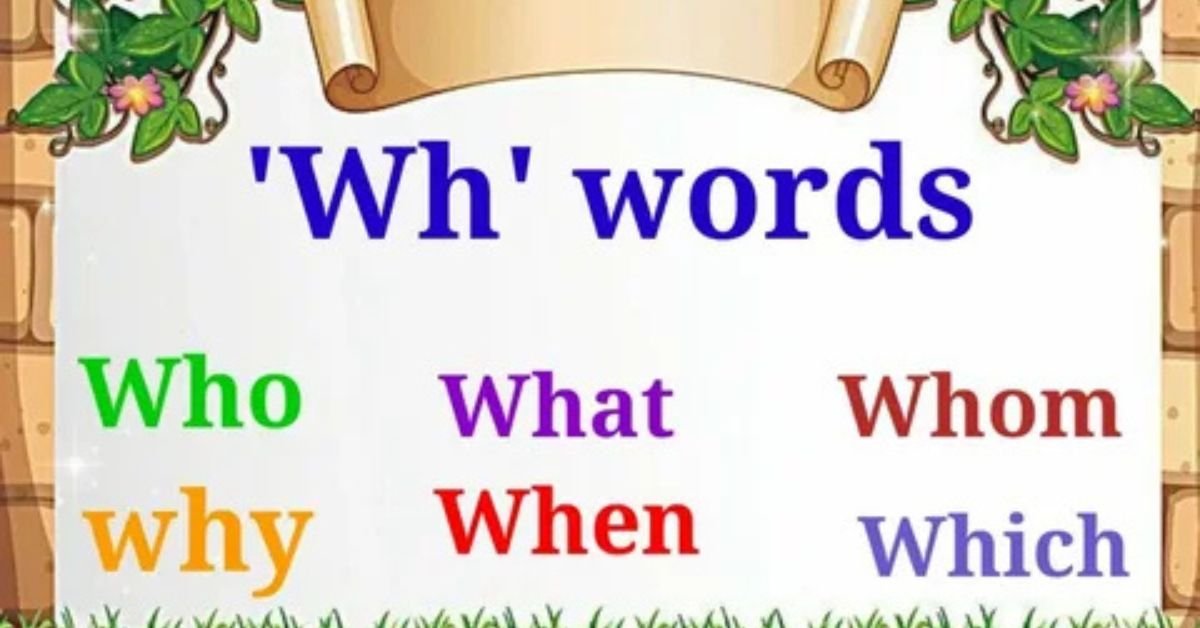
WH words are essential tools that help children explore the world and enhance their language skills. Here’s why learning these words is so important:
- Encourages Curiosity: WH words spark curiosity in kids. These words naturally invite children to ask questions about their surroundings, encouraging them to explore, learn, and satisfy their natural curiosity.
- Improves Communication: Learning how to ask questions correctly helps children communicate more effectively. It helps them engage in conversations, learn new vocabulary, and understand others better.
- Develops Critical Thinking: By asking questions, children develop critical thinking skills. They begin to think about reasons, causes, processes, and the world around them in a more structured and thoughtful way.
- Supports Reading and Writing: WH words play a significant role in reading comprehension and writing. Kids who can form questions can better understand stories, make predictions, and summarize what they’ve read. In writing, these words help children create stories, develop ideas, and organize their thoughts.
- Builds Emotional Intelligence: When children use why questions, they not only understand the reasons behind things but also learn to express their feelings and seek clarity about emotions and situations.
By learning WH words early on, children become more confident in their ability to express themselves and engage in meaningful dialogues.
Fun Activities to Learn WH Words
Learning WH words doesn’t have to be a boring task. Many fun and interactive activities can help kids enjoy learning.
1. WH Word Bingo
Create bingo cards with WH words like Who, What, Where, etc., written on them. Call out the questions, and kids mark the correct WH word on their card. The first to complete their card wins. It’s an enjoyable and simple method to strengthen learning.
2. Question Jar
Make a question jar by adding slips of paper, each with a WH word question written on it. For example, what is your favorite animal? For example, you could ask, ‘Where would you like to go on holiday? Each day, let your child draw a question from the jar and answer it. This encourages curiosity and builds conversation skills.
3. Storytime with WH Questions
After reading a book or telling a story, pause and ask your child WH questions related to the story. For instance, what action did the character take next? Or why did the character feel scared? This helps kids develop comprehension and critical thinking.
4. Scavenger Hunt
Give your child a list of places or things to find around the house or outside. Use WH words in your instructions. For example, Where is your red toy? or Who can find something with wheels? This turns learning into an exciting adventure.
5. Picture Exploration
Display a picture to your child and ask questions that begin with WH words. For example, who is in this picture? What are they doing? Or where are they? This helps kids use WH words to describe and analyze images.
Common Mistakes Kids Make with WH Words
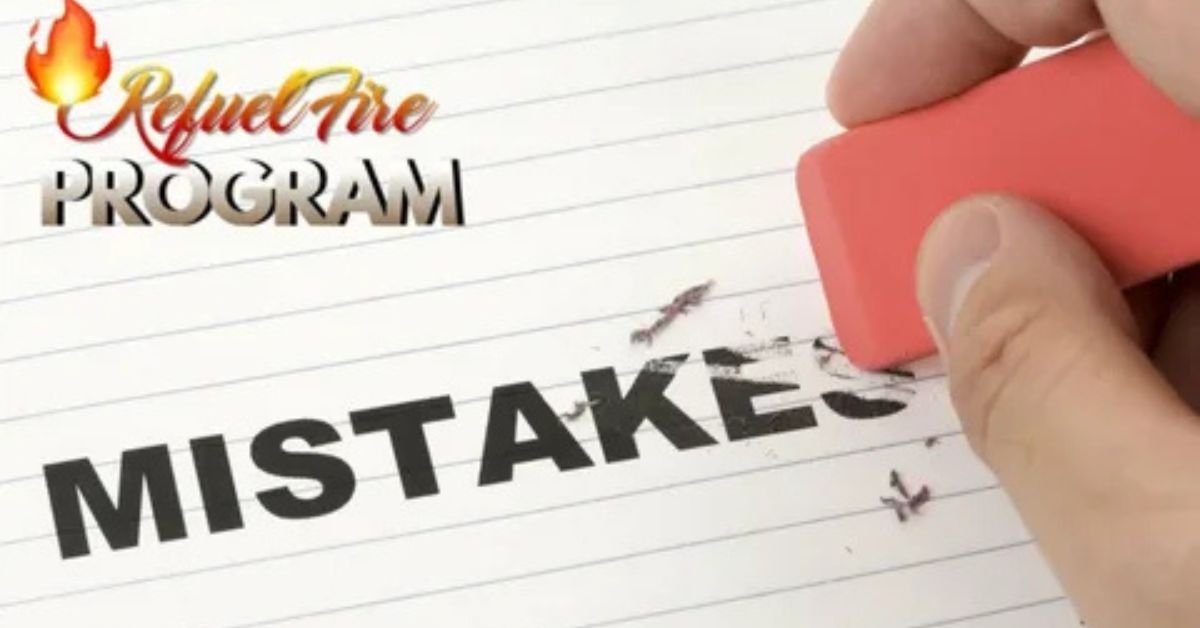
While learning WH words, kids might make a few common mistakes. Here are some common errors along with how to fix them.
- Using the Wrong WH Word: Kids might say, ‘Who is your name?’ when they mean, ‘What is your name?’ when they mean to ask, ‘What is your name?’ Encourage them to focus on the correct WH word based on what they’re asking.
- Not Using Complete Sentences: It’s common for kids to say, Where is? instead of Where is my book? Practice full sentence questions with your child.
- Forgetting to Invert the Verb: When kids are asking questions, they might say, You are where? instead of Where are you? Make sure to explain the word order in questions.
Conclusion
WH words are essential for helping children develop their language skills. They help kids ask questions, explore their surroundings, and connect with others effectively. Mastering WH words gives kids the confidence to express themselves clearly and build essential communication skills. By incorporating fun activities and consistent practice, children can easily learn these words and start using them in their everyday conversations.
Encourage your child to ask questions using WH words, whether in play, storytelling, or real-life situations. The more they practice, the more fluent they’ll become in their ability to communicate effectively.
FAQs
1. What is the most common WH word?
What is the most widely used WH word, helping children ask questions about things, actions, or situations.
2. Why are WH words important for kids?
WH words encourage kids to communicate effectively, explore their curiosity, and develop critical thinking skills.
3. How can I teach my child WH words?
Make learning interactive with games like WH Bingo, storytelling, or scavenger hunts that include WH words.
4. At what age should kids start learning WH words?
Children can start using WH words around age 3, but the timing may vary depending on individual development.
5. Can WH words help with reading and writing?
Yes, understanding WH words improves reading comprehension and helps children express ideas clearly in writing.

Aoon Abbas is an experienced SEO expert dedicated to helping businesses grow through data-driven strategies, keyword optimization, and effective digital marketing.


